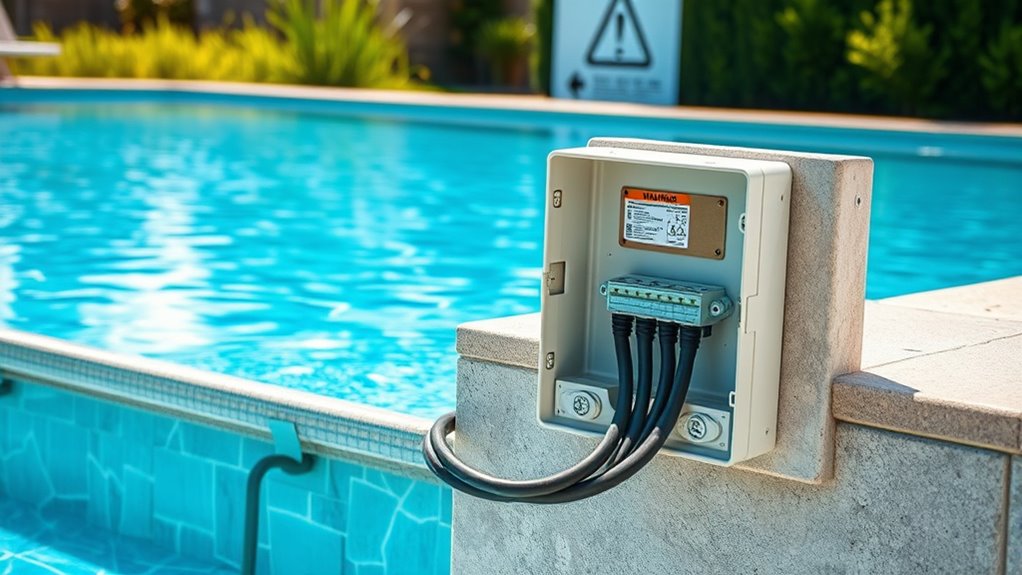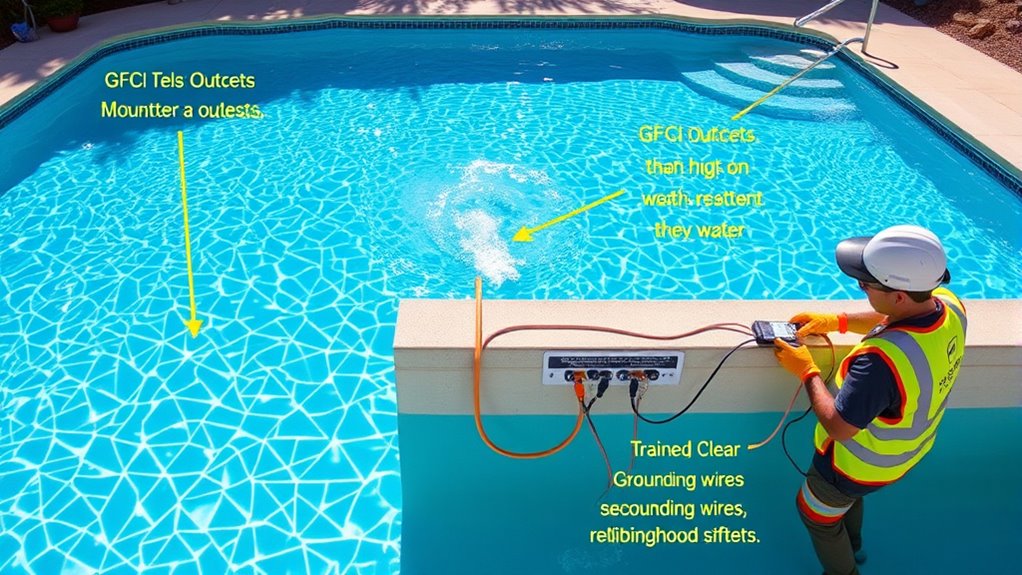To prevent shock hazards around your pool, make certain all electrical systems are properly installed by qualified electricians using waterproof, outdoor-rated fixtures. Regularly inspect for corrosion, cracks, or loose connections, and always keep electrical equipment away from water’s edge. Install GFCIs on all outdoor outlets and test them monthly to protect against leaks and faults. Following these safety measures will help keep your pool area safe; discover more ways to enhance electrical safety with continued guidance.
Key Takeaways
- Ensure all pool lighting and electrical components are installed by qualified electricians using waterproof, outdoor-rated fixtures.
- Install and regularly test GFCIs on all outdoor outlets and pool circuits to instantly shut off power during faults.
- Conduct routine inspections for corrosion, cracks, or loose connections in electrical equipment to prevent water contact and shocks.
- Maintain proper grounding of pool electrical systems to reduce the risk of electrical shock hazards.
- Turn off power and seek professional help immediately if electrical issues or GFCI trips occur.

Swimming pools can be fun and invigorating, but they also pose considerable electrical hazards if not properly maintained. One of the most common risks involves faulty or improper pool lighting. Many pools feature underwater lights to enhance nighttime swimming, but these fixtures require careful installation and regular inspection. If pool lighting isn’t properly grounded or if waterproof seals degrade over time, water can come into contact with electrical components, creating a dangerous shock hazard. To prevent this, always verify your pool lighting is installed by a qualified electrician and that it meets local safety codes. Use outdoor-rated, waterproof fixtures designed specifically for pool environments, and regularly check for corrosion, cracks, or loose connections. If any issues arise, have them repaired immediately to avoid potential shocks.
Another critical safety measure is GFCI protection, which stands for Ground Fault Circuit Interrupter. GFCIs are designed to shut off electrical power instantly if they detect a ground fault or leakage, markedly reducing the risk of electric shock. It’s essential that all outdoor electrical outlets and circuits servicing your pool area are equipped with GFCIs. This includes outlets for pumps, lights, and other equipment. GFCI protection acts as a safety net, cutting power before a shock can occur if water makes contact with electrical parts. Many modern pools come with GFCI-protected circuits built into their electrical systems, but if yours doesn’t, have a licensed electrician install them. Remember, GFCIs can wear out over time, so testing them monthly is a good practice. Many GFCIs have a test button—press it regularly to ensure it’s functioning correctly. If the GFCI trips during testing or unexpectedly, turn off all pool equipment and call a professional to inspect the system.
Properly maintaining pool lighting and guaranteeing GFCI protection are simple yet crucial steps to protect yourself and others from electrical shocks. Never ignore signs of electrical problems, like flickering lights, tripped GFCIs, or damaged wiring. Always turn off power at the breaker before inspecting or repairing any electrical components around the pool. Keep electrical equipment at a safe distance from the water’s edge, and avoid running extension cords or temporary wiring in wet conditions. Additionally, understanding the importance of proper grounding in electrical systems can significantly reduce risks associated with electrical faults near water. By following these safety practices, you can enjoy your pool without the worry of electrical hazards. Staying vigilant about pool lighting and GFCI protection ensures that your swimming experience remains safe, fun, and shock-free.
Frequently Asked Questions
Can I Use Regular Extension Cords Around My Pool?
You shouldn’t use regular extension cords around your pool because they can pose serious safety risks. For pool safety, only use outdoor-rated, GFCI-protected extension cords designed for wet environments. These cords prevent electrical shock hazards by shutting off power when a ground fault occurs. Always verify cords are kept away from water, and use proper outlets and equipment to maintain a safe swimming area. Never compromise on safety with makeshift solutions.
How Often Should Pool Electrical Equipment Be Inspected?
You should inspect your pool electrical equipment at least once a year to guarantee electrical code compliance and safety. Regular equipment maintenance scheduling helps catch potential issues early, preventing shock hazards. Check for signs of wear, corrosion, or damage, and verify that all connections are secure. By staying proactive with these inspections, you help keep your pool area safe and compliant with safety standards.
Are There Specific Grounding Requirements for Pool Lights?
Think of your pool lights as shining stars needing a solid foundation. Yes, there are specific grounding requirements for pool lights that follow strict grounding standards and wiring regulations. You must guarantee the lights are properly grounded to prevent shock hazards, with grounding conductors connected to the main grounding system. This creates a safe, reliable path for electrical faults, keeping your pool area safe and sparkling.
What Signs Indicate a Potential Electrical Hazard in the Pool Area?
You should watch for warning signs like sparks, frayed wires, or a tingling sensation when touching the water or fixtures. Unusual sounds or a burning smell also indicate potential pool electrical hazards. If you notice any of these warning signs, turn off power immediately and contact a qualified electrician. Regular inspections and proper grounding help prevent these hazards, ensuring a safe swimming environment for everyone.
Is It Safe to Install Pool Equipment Myself Without Professional Help?
You might think you can handle DIY safety for pool equipment, but it’s risky to install electrical components yourself. Even a small mistake can lead to dangerous shock hazards. Professional installation guarantees everything meets safety standards and reduces your risk of accidents. Trust experts to handle your pool’s electrical setup—this way, you can enjoy your pool with peace of mind, knowing safety is prioritized and your investment is protected.
Conclusion
Remember, safety is a chain only as strong as its weakest link. Keep your pool’s electrical systems regularly inspected and verify proper grounding and GFCIs are in place. Never ignore warning signs or shortcuts—prevention is key. Think of it like a well-tended garden; if you don’t water and care for it, it’ll wither. By staying vigilant and proactive, you can enjoy your pool safely and keep shock hazards at bay.









